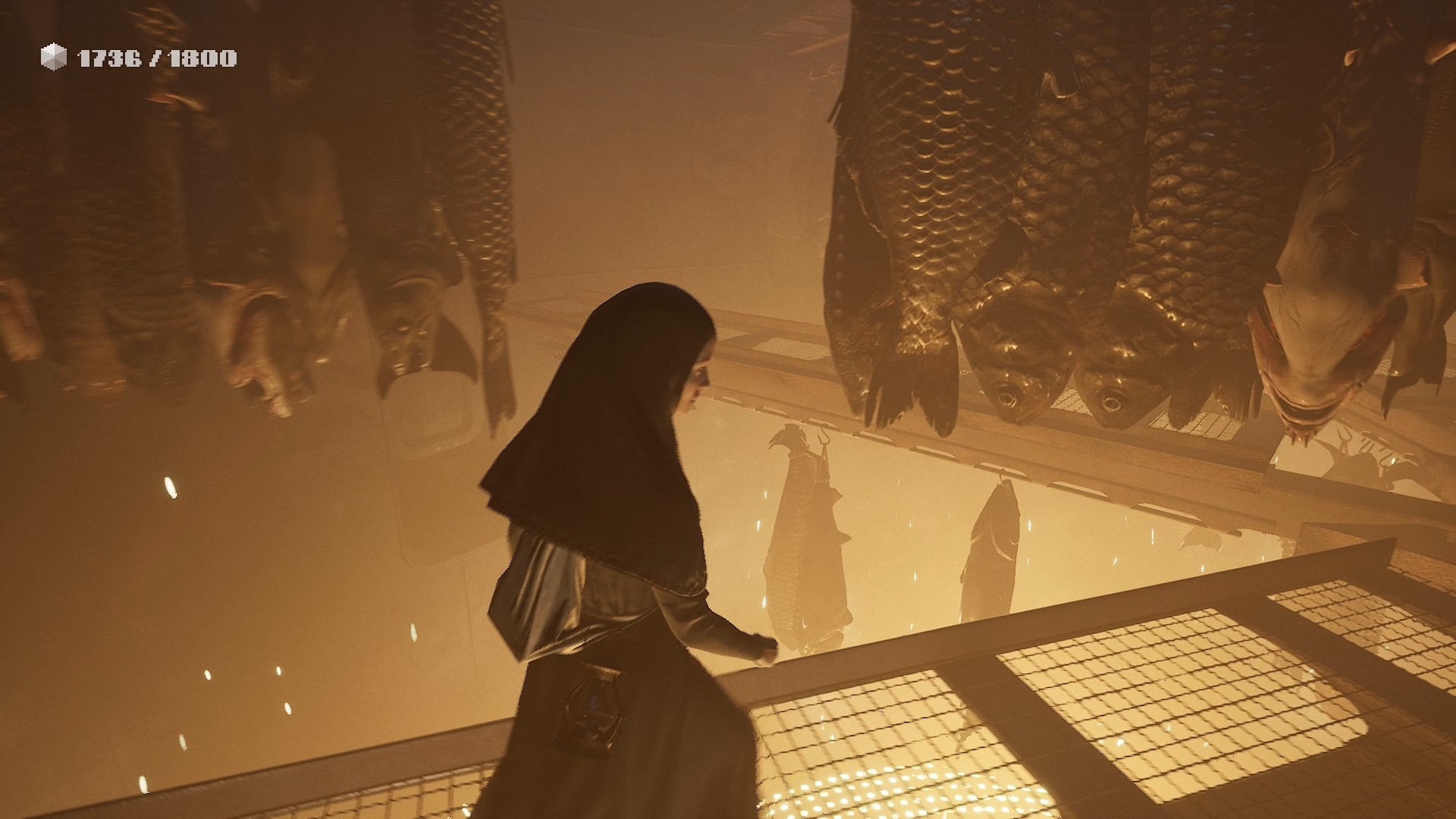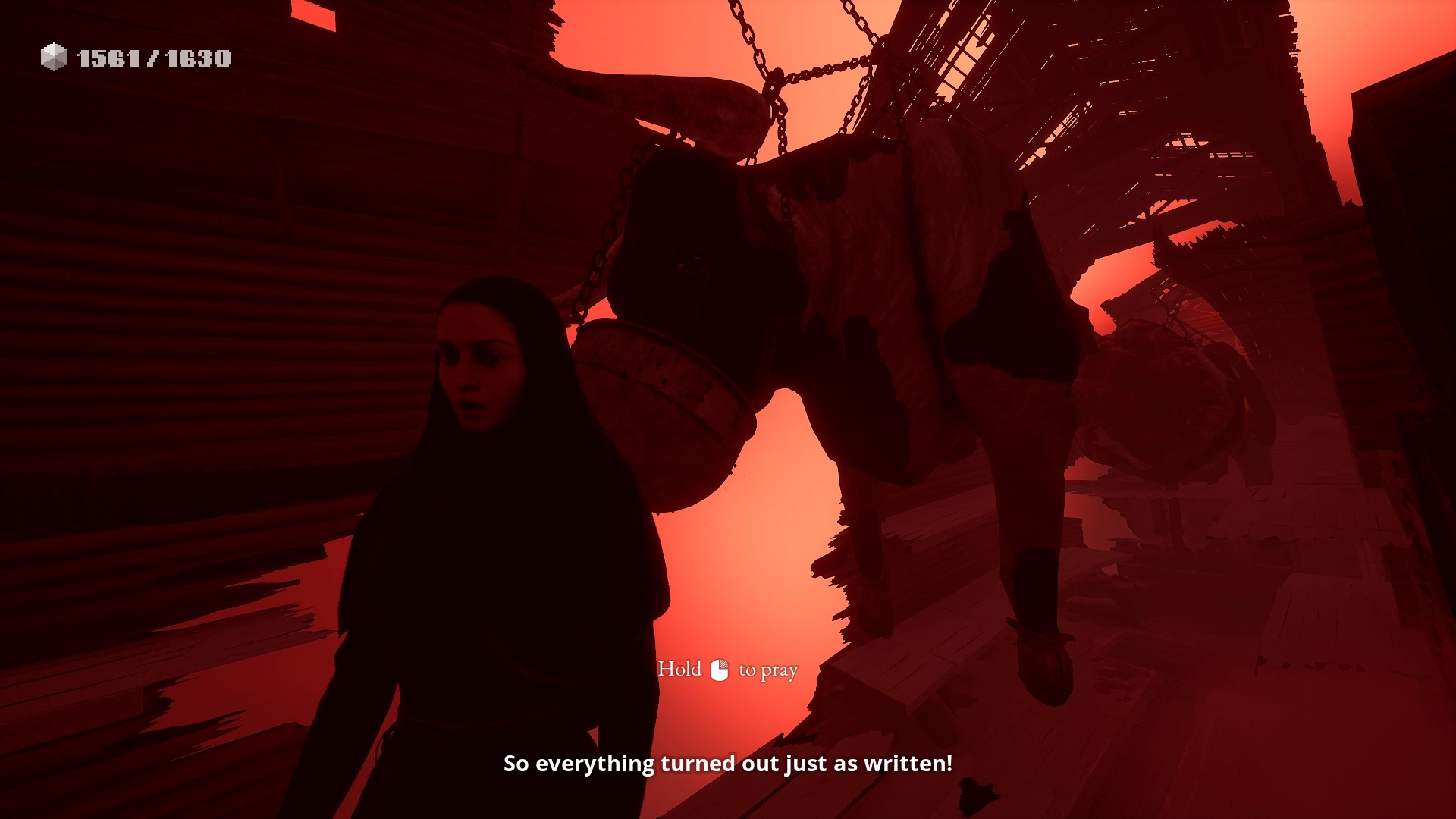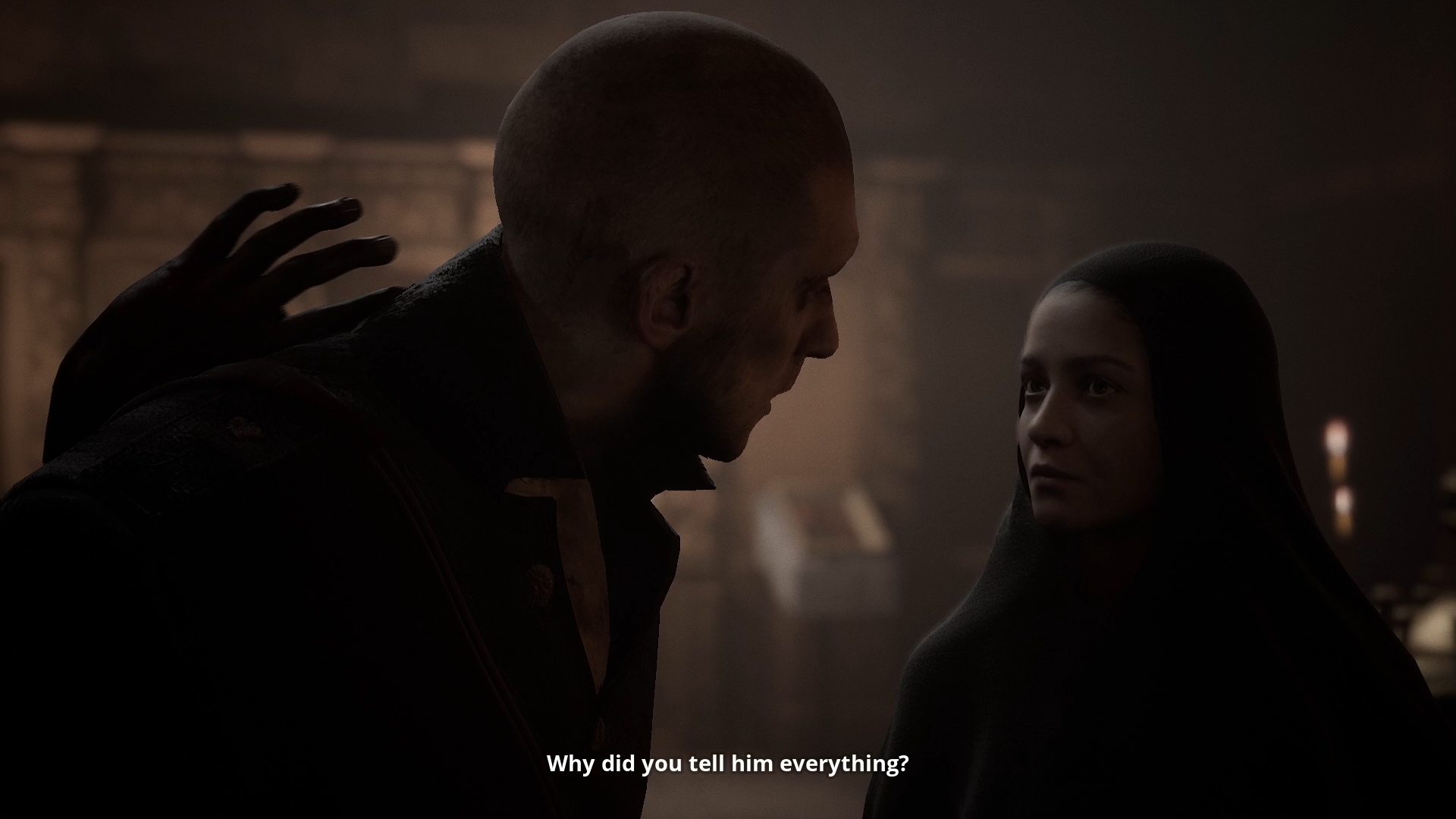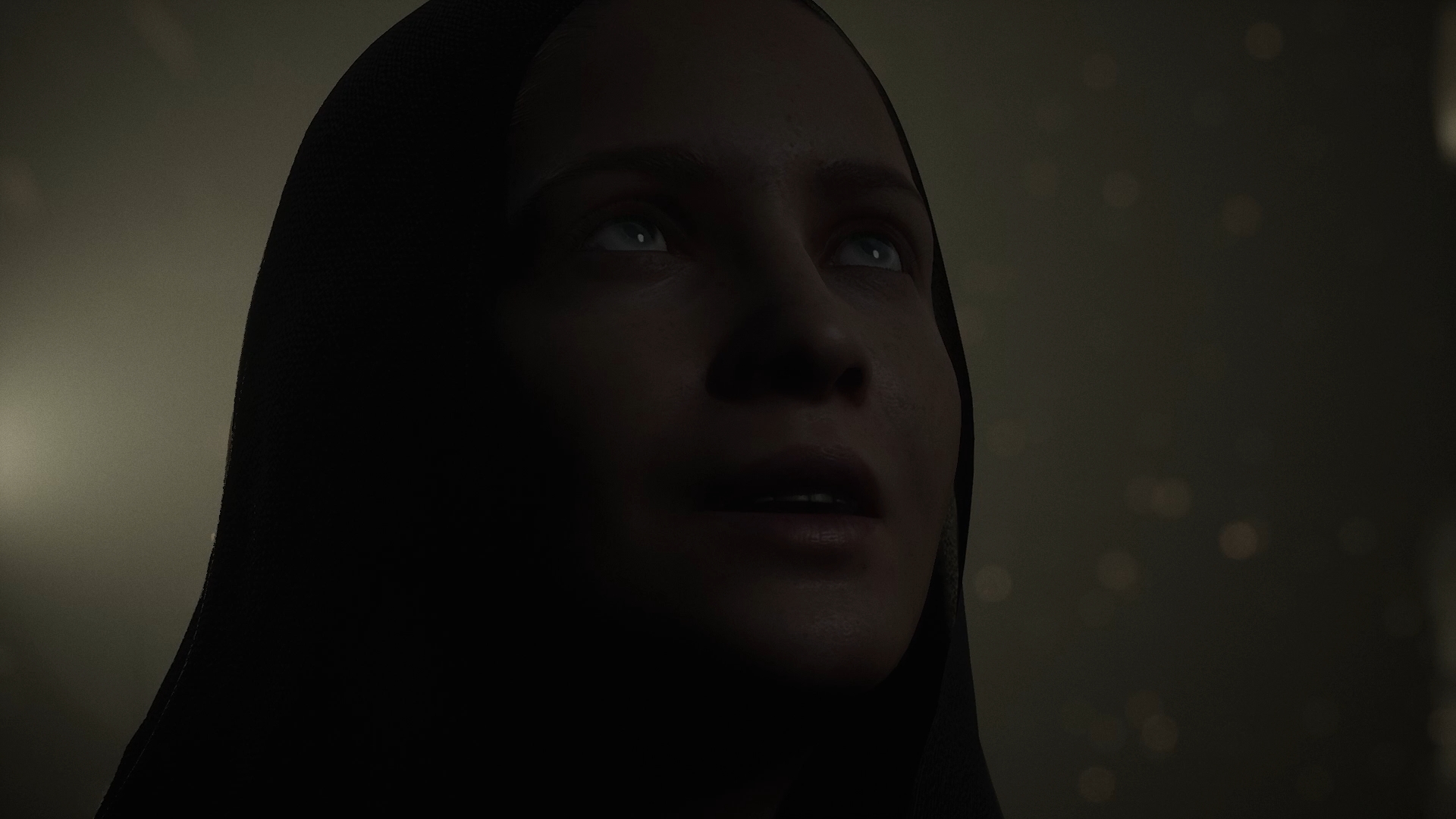‘Indika’ Review: A Bleak and Bizarre World Worth Exploring

How do you tell the tale of a young Orthodox nun grappling with her faith and struggling to suppress intrusive thoughts? What would be the best format to explore the weights and measures of morality or the efficacy of ritual as a path to salvation? If you were the game studio Odd Meter, you’d say (in Russian), “An adventure game,” and you’d be right.
The result is Indika, a third-person narrative-driven adventure that pushes the boundaries of both genre and medium. The game repurposes cinematic language, literary tropes, and video game clichés as tools to build its allegory. It’s a heart-wrenching story, with pitch-black humor dovetailing into the genuine tragedy at its core. Unconventional as it is, Indika is much more deliberate than the acid trip promised by its trailers, an avant-garde and, oftentimes, horrific.
The titular character, Indika, struggles to fit into her convent and can’t seem to get into the habit of being a good nun. She’s also constantly harangued by the devil, which doesn’t help with pious living or making friends. After an arduous opening gameplay section that emphasizes the drudgery of monastic life, Indika is given a mission and sent out into the world. Unfortunately for Indika, that world is a twisted, surrealist interpretation of Tsarist Russia. It’s not long before the mission is quite literally derailed by a man named Ilya.
Also Read: ‘Interview with the Vampire’ Season 2 Review: AMC+’s Underrated Gem Is Back and Better Than Ever
Ilya is an escaped prisoner with a rotting arm who’s both our kidnapper and traveling companion. Where Indika seeks absolution, Ilya hunts for redemption and restoration. Together, they seek out a miracle in the city of Spasov. The Path to Spasov is a pretty linear affair. You’ll mostly be walking and clambering through the game’s set pieces, which take the form of haunting villages and imposing factories. There are a smattering of puzzles throughout, but most don’t present any real challenge. One series of puzzles involves the devil ripping apart Indika’s world, forcing her to alternate between prayer and psychosis to make the path navigable. It’s more visually striking than it is difficult, but it offers a welcome change of pace.

There is a leveling system—kind of. To level up, Indika has to illuminate shrines, find hidden icons and books, and pray at opportune moments or in the direction of Jesus. Points can be invested in things like guilt, shame, regret, or humility. It serves as both a fun addition and a cute skewer on which to serve a point about faith.
In flashbacks, the game switches to a charming pixel art style that has the player racing bikes and platforming across the heads of frogs. It’s a shame that all the creative gameplay elements are used so sparingly. But at the same time, the restraint was imperative in highlighting the importance of select moments. With such a strong emphasis on visual storytelling, it’s no surprise that the game looks incredible. Every corner is meticulously designed and rendered: from the ornament and construction of log cabins to the wood joinery on weathered railings, there is painstaking attention to detail.
Also Read: ‘Rolling Thunder’ Sinks a New Hook into Home Video [4K Review]

Odd Meter knows it looks good, too, with benches placed around the map to allow players to relax and cycle between composed shots of critical locations. And yeah, I sat at them all. Cut scenes are creatively blocked and staged, with the camera routinely finding its way into unconventional places. The creative perspectives, paired with the shifting focal lengths and depth of field, keep the viewer feeling unmoored. While you may just be watching a scene unfold, it doesn’t always feel like a passive experience.
The odd and varied visual presentation is accompanied by a similarly weird soundscape. Indika and Ilya offer subtle, melancholic dialogue punctuated by the verbose and expressive interruptions of the devil. Silas Carson’s rendition of the devil is an absolute highlight. Though often colorfully derisive and antagonistic, this devil isn’t one-dimensionally evil; he mostly appeals to Indika’s rational mind and, at times, even offers authoritative compassion. The charismatic delivery was always something to look forward to.
Also Read: ‘Sasquatch Sunset’ Review: The Patriarchy Sucks Even For Bigfoot

The soundtrack is a bit more of a mixed bag. Like everything else, it is…unique. Surprising, I know. It certainly takes some risks. There is a pervasive coolness and some great arrangements, but at points, it was distractingly goofy for my tastes.
Indika is a purposefully lonely experience. For much of the runtime, there isn’t any music, just ambient soundscapes. Howling winds, crunching snow, and creaks of contracting wood are an unrelenting reminder of the brutality and frigidity of this world. As someone who lives in a country that’s most notable for its winters, I assure you the slushy puddle noises under each footstep were real enough to make my socks feel wet.
It’s very well done. I hate it.

More than anything, a game like this lives and dies on its writing, which should be top-notch when the marketing team chooses to liken it to Dostoyevski and Bulhakov. And it is top-notch. Indika uses orthodoxy as a frame to ask its questions, but the work inside is a more universal reflection on morality, punishment, belonging, and conformity. It’s an intimate analysis of the anxious space between body and soul and the comedy inherent to “goodness” in a world that’s essentially a fishpacking plant.
Also Read: ‘Gateway’ Review: A Chilling Mumblegore Haunted House Story
Indika is an incredibly compelling lead whose conflicts and motivations delve into truly tragic territory. She is mechanically inclined and a deep, critical thinker. While she understands the rules and logic of machines, she struggles with what she views as illogical and unfair impositions on her body and soul. Ilya is similarly complex—his dreams are literally rotting away as he desperately clings to the idea of a miracle that can restore his health. A “thick boy” who hopes to find salvation through religion but then kidnaps a nun to meet that end.
The level design alludes to and juxtaposes the issues at hand. Moving through upside-down houses and shifting giant cans of caviar are interesting, and somehow, they’re always in service to the narrative.

For example, Indika has a conversation with the devil over how sinful it is to lose a letter and how many letters would have to be lost to equal a murder. It’s a question asked in a slaughterhouse, which would normally have to accommodate hundreds of animals, but this one houses a singular, gigantic cow. The weights and measures that make things virtuous and moral are a key theme. How many regular cows do you have to kill to equal one massive one? Or what is the value of a super-cow’s life in the measure of lost mail? It’s overly grotesque and absurd but made for some great comedy.
Also Read: ‘Sheryl’ Panic Fest 2024 Review: One Woman’s Bloody Quest for Perfection
Locations like the puppet-making shop that also builds children’s coffins offer a more sober insight into this world. Indika only remarks on the puppets and not the coffins, which hints at how normal the latter must be. This excellent visual storytelling exists throughout the game.
Indika is an outstanding narrative adventure that makes full use of its medium to drive home its points. It’s a difficult story presented with originality, creativity, and style. While not highly replayable, there’s an incredible amount of detail that inspired me to lay off the sprint button and embrace exploration. It could have utilized its creative gameplay elements more frequently, but being left wanting more isn’t really a bad thing. Like a ribeye from a colossal cow, Indika offers a lot to chew on in its six-hour runtime.

Odd Meter set out to make an aesthetic title that was ethically difficult and creatively aberrant, and to that end, Indika is a success. If you’re comfortable with the heavy subject matter covered in the story, it’s absolutely worth checking out.
Indika
-
Indika
Summary
‘Indika’ is much more deliberate than the acid trip promised by its trailers, an ultimately avant-garde and, oftentimes, horrific experience.
Categorized:Reviews Video Games
